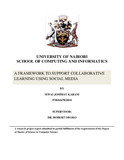| dc.description.abstract | New frameworks for developing interactions between the actors of learning processes require new ways of gaining an understanding of such processes. Today, these frameworks are of a technological kind, and their prime expression is found in social networking sites, which have already been called „social operating systems‟. Students have gone ahead and taken advantage of these platforms by creating virtual learning environments, which are quickly becoming repositories of collective knowledge and teaching resources. Unfortunately, we are not able to fully utilize this collective knowledge being generated through group member‟s interaction. The focus of this study, was to ensure that the knowledge being generated through social media is not lost. This was achieved by developing a framework that was able to extract, classify and store the classified comments from a social media account to support collaborative leering.
The prototype was then evaluated at the Kenya Institute of Education using a staff induction course that had four modules. Data collection tools used were interviews and questionnaires the interviews were used as part of requirements gathering, this was done to gain background data on the use of social media among the learners. The learners interacted with the prototype for two weeks and evaluated it based on usability and functionality.
Data analysis was presented using descriptive statistics. From the initial survey it was evident that all of the respondents had social media accounts, but very few used them for educational purposes. The study finding indicated that majority of the learners were comfortable interacting with the prototype and that they require minimal training on how to use it. The learners were consistently positive in their assessment regarding functionality of the prototype. From the finding it was evident that web 2.0 tools in particular social media have enormous potential in education and that learners are comfortable using these tools.
The study focused only on developing an enabling environment for learners to interact and be able to capture and store the knowledge generated through these interaction. However, how interactions affects learning and the relationship between the two is a complex pedagogical phenomenon that requires further investigation. | en |

